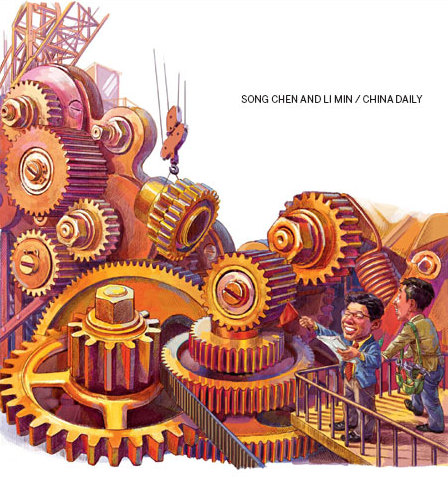Gear change
Updated: 2013-11-15 09:54
By Hu Yuanyuan, Li Xiaokun and Zhang Chunyan (China Daily Europe)
|
|||||||||||
'Sustainable development', 'decisive role for markets' are the new buzzwords for Chinese economy
Decisive reforms in key areas and allowing the markets to play a bigger role will help China achieve sustainable growth and stabilize the global economy, experts say.
By signaling their intent to achieve tangible results by 2020, policymakers seem to be clear that the way forward for China is not speedy, but slow and steady growth. In many ways, that also seems to be the core message of the four-day Third Plenum of the Communist Party of China's 18th Central Committee, which ended in Beijing on Nov 12.
The key highlights of the session are the specialized high-level group that will oversee the reform and opening-up process for the next decade and the decision to allow the markets to play a decisive role in allocating resources.
"The reform package clearly shows that the government is keen to advance market-based reforms to achieve quality growth," says Wang Haifeng, a researcher at the Institute for International Economic Research of the National Development and Reform Commission.
"Slower but steady growth in China means more for the global economy, compared with highly fluctuating growth," Wang says.
The new Central Reform Leading Group is likely to be an even higher-level body than the former economic reform commission, says Liu Fuhuan, of the Academy of Macroeconomic Research under the National Development and Reform Commission.
The new leading group will probably be positioned at the same level as the Central Finance and Economy Leading Group, he says.
Part of the new group's duties, apart from economic reform, is to plan and carry out reform on modernizing China's "governance system" and "governance capability".
Wang Yukai, a professor at the Chinese Academy of Governance, says administrative reforms will be a major plank in China's next round of reforms, and that it will also result in less interference with the market.
In a communique that mentioned the word "market" 22 times, Chinese leaders attributed the "decisive role" of the market economy in allocating resources. The communique, released at the end of the four-day session, pledged to speed up the building of China's modern market system, its macroeconomic stewardship and its open economic system.
Market forces
Indicating that reform of the economic system is the core of a broader reform agenda, policymakers have stressed the need to let the market to play a decisive role in allocating resources, and allowing the government better fulfill its role.
The role of the market has been taken to an unprecedented level in China since it adopted a socialist market economy in 1993, when the Party tentatively defined the market's role as "basic" in allocating resources.
The new emphasis is expected to bring more market vitality, competition and equal access in otherwise monopolized sectors, analysts say.
Zhang Zhuoyuan, an economist at the Chinese Academy of Social Sciences who attended the meeting, says the "decisive role of the market" is the most important reform measure outlined in the statement.
"It is apparent that the market will have more say in the allocation of resources, while less room is left for the government," he says.
The communique released after the 1993 Third Plenum recognized the "basic role" of the market, but Zhang says it was a compromise reached at a time when the consensus for a market economy was insufficient.
"It is time to break away from excessive government control and allow the market to take the lead. The market should be entrusted with the role it deserves in a market economy," he says.
Global ratings agency Standard & Poor's has indicated that the current reforms will have a positive bearing on China's long-term sovereign credit ratings.
"An increasingly market-driven economy plus a government with better governance could help the country sustain per-capita real GDP growth at above-average rates," S&P credit analyst Kim Eng Tan said in a statement.
"At the same time, it would reduce the country's reliance on credit-driven investment spending as a source of economic growth, which could also assimilate the financial risks that have built up over recent years."
The more decisive market role will involve areas such as interest rate liberalization, moves to remove administrative barriers to private capital, and other forms of financial liberalization.
Today's Top News
Boeing airliner crashes in Russia, 50 killed
Lanzhou takes lead to curb car use
EU, China in right direction
Bringing China's best minds home
Abe busy in ASEAN at Beijing
China's FTZs promise flourishing growth
China police nab 4 drug suspects
President Xi meets Dutch PM
Hot Topics
Lunar probe , China growth forecasts, Emission rules get tougher, China seen through 'colored lens', International board,
Editor's Picks

|

|

|

|

|

|






